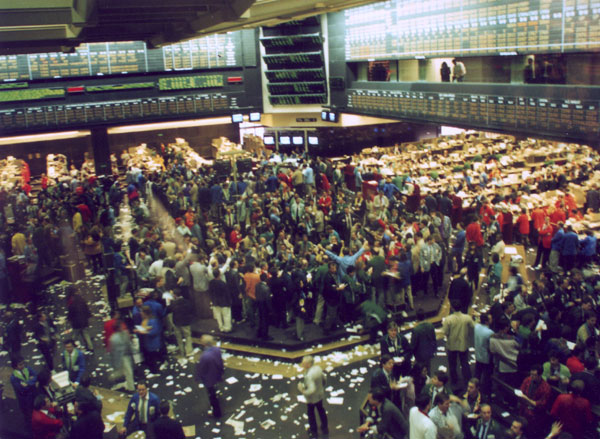Do you sometimes wonder how really the markets are so active at all the times? Or who is there buying and selling from the opening bell to the last minute of trade time? Is it really only the investors or traders who are deriving the price of the stocks or markets? How most of the stocks or different commodities or currencies or bond markets are active simultaneously? How most of the stocks fall or rise in sync with the index and futures?
Markets are so wide that at any point of time, there are different categories of players participating in the market with diverse risk profiles and objectives. Some hedger must be creating some positions in the market to reduce or control their risk and at the same time on the other side some speculator must be selling the market with a bearish thought while some other participant must be having a different opinion and must be creating long positions in the market.
Hedgers
Hedgers are the only reason for the evolution and existence of the futures market. Today`s global liberalized activities has increased the need and use of futures market to help companies reduce or limit the risk associated with an adverse price movements. Producers, such as farmers, often sell futures on the crops they raise to hedge against a drop in commodity prices such as potato, onion, wheat, etc. This makes it easier for producers to do long-term planning.
Suppose, a farmer producing the wheat expects to harvest 1000 Quintal of wheat after 3 months, and fears that the market price of wheat may drop in these 3 months. So, to take the benefit of current high price or to reduce the price change risk, he goes to the commodities exchange and sells 1000 Quintal of wheat at the current market price of say Rs. 150 per quintal for the contract expiring after 3 months.
Say, after the 3 months, the price declines to Rs. 130, and then he has to buy back the contract at Rs. 130 that he sold earlier with the exchange at Rs. 150 making a profit of Rs. 20 per quintal and sells the raised wheat at the market price of Rs. 130. So, his effective selling price is 130+20 = Rs. 150.
Or the other way, that he delivers 1000 Quintal of promised wheat to the exchange after 3 months which he sold 3 months earlier at Rs. 150.
On the other hand, Say, after 3 months, the price rises to Rs. 180, and then he has to buy back the contract at Rs. 180 that he sold earlier with the exchange at Rs. 150 making a loss of Rs. 30 and sells the wheat he raised at the market price of Rs. 180. So, his effective selling price will be 180-30 = Rs. 150
Or the other way, he will deliver 100 Quintal of promised wheat to the exchange after 3 months which he sold earlier at Rs. 150 and not getting Rs. 180 now.
This nullifies the total effect of hedging process, i.e. NO PROFIT OR NO LOSS. So this clarifies the ultimate objective of hedging is to reduce or limit the risk of future price movement than to predict the price movement to make profits.
Similarly, consumers such as food processing plants often buy futures to secure their input costs. This allows them to base their business planning on a fixed cost for core ingredients, such as corn and wheat.
Other examples include: Information Technology or outsourcing or importing or exporting companies hedging the risk of currency fluctuations or jewelry manufacturers hedging the cost of gold and silver or investment fund hedging the risk of market fluctuation with index futures or airlines hedging fuel costs. This makes it easier for these companies to manage price risk and stabilize the cost passed on to the end-user.
Speculators
Speculators accepts the risk in the market to take the benefit of the favorable price movement of the stocks, commodities or index, etc. They are the one who provide immense liquidity in the markets and in turn helping the hedgers to enter and exit the futures markets in an efficient manner. Speculators could be short term individual traders or investors or full time professional traders or institutions trading stocks or futures or options in an attempt to make profits. They are the one who do not have any position in the underlying asset like hedgers rather they are trading in the market to take the benefit of the price movements.
Suppose, an individual expects that in the coming months there will be shortage of wheat supply in the market due to low rainfall then he goes to the commodities exchange and buy the futures contract of wheat say at Rs. 150, then say after a month price of the wheat rise to Rs.165 then he can sells this futures contract at Rs. 165 and make a profit of Rs. 15.
So, he does not have any effect of wheat prices on his business activity like hedgers, but they are speculating on the direction of the wheat price to make trading profits.
Arbitrageurs
Arbitrageur’s attempts to make profit by taking low or no risk trades by simultaneous buying a security in one market and corresponding selling it in another market. They help market to be price efficient at most the time by taking the benefit of any price discrepancies in different markets (Cash & Futures Market) or different exchanges (NSE & BSE) arising due to increased market volatility and price movements.
Arbitrage in different markets
Cash market price of Reliance Industries is trading at the price of Rs. 900 and in the futures market it is trading at Rs. 910 then the arbitrageur will sell the Reliance Futures contract of at Rs. 910 and buy it at Rs. 900 in the cash market and on the day of expiry both of them will converge at the same price* so the arbitrageur makes a risk free profit of Rs.10 by buying back the futures contract and selling the stocks in cash market.
*As in India, all the futures contract are cash settled and expires at the cash market price on the expiry date.
Arbitrages in different Exchange
In India, at present stocks are traded in two different exchanges National Stock Exchange (NSE) & Bombay Stock Exchange (BSE). Arbitrage opportunity arises whenever price of the same stock is different in these two stock exchanges at certain point in time. Provided he can only sell in any of the exchange if he has a prior holding in that particular stock as he has to deliver that stock to the exchange in which he sells.
Example – Suppose, an investor is holding some stocks of Reliance Industry and at some point, it is trading at a price of Rs. 900 in NSE & Rs. 902 in BSE, and then investor (arbitrageur) will jump in to sell it in BSE at 902 & simultaneously buy in NSE at 900 and making a risk free profit of Rs. 2.
Treatment of Indifference
Trading is the only business one of its kind where you will find or encounter with people from every profession, financial background & structure. Doctors, lawyers, businessman, artisans, investment companies, institutional players, Retail, and HNIs participates in the market with different risk profiles and diverse trading objectives. Any investor can open a trading account and start the trading activity in the market and market makes no difference or categorize or differentiate them on the basis of their financial, social, or professional backgrounds i.e. whether the order is placed by a Institutional or a retail player or say by the owner or employee or clerk of any company. Every buying order is matched with the selling order in the same way without differentiating it on the basis of the quantum of order or the background of the participant.
Now, let’s brief out the diverse market participants on the basis of their horizon of investment, market interest, and traders background and profession.
Investors
Generally speaking, Investors are the lifeline for the businesses as they are the one who believe in the dreams of the business persons and are ready to part their savings for an investment objective. They are basically long term players often carrying positions for few months to years. Investors could be an individual player or an institution firms like insurance companies, Hedge funds, Mutual Funds or Proprietary Companies.
Traders
Traders are short term market players who enter and exit the market more often which can varies from trade lasting from few minutes to weeks or months.
- Day Traders – A trader who buys and sells a particular security during the same day. They do not carry their positions overnight, so all the positions created by a day trader will be squared off before the closing bell of the market. The objective is to make profits by taking advantage of small price movements in highly liquid stocks or in futures (Stock futures, index futures, commodity futures, etc). They are the one who provides immense liquidity in the market helping other participants to enter and exit the market more easily and efficiently.
- Position Traders – They carry their position for more than a single day varying from days to weeks or months.
Domestic & Foreign Players
Any participant who trades in the same country he belongs to are known as Domestic players, while on the other hand those who trades the foreign markets are known as Foreign Institutional Investors (FIIs). FIIs could be any foreign investment trusts, asset management companies, portfolio managers, university or Proprietary funds. In India, over the last decade, participation of FIIs has increased by many folds and they play a very vital role in the development and growth of the financial markets on a whole.
To understand the level and importance of participation of FIIs in Indian Equity Market. Browse arounf the purchases and sellings of the FII / DII Trading in Indian Equity Market.
Individual Traders
Generally speaking, Individual traders are categorized to those who manage and trade their own funds. Electronic Trading has played as a boon to these traders by providing them instant access to price and information which helped them in timely execution of trades with complete transparency which was earlier limited to institutions and big players.
Portfolio Managers
A portfolio manager is a person who makes investment decisions and manages funds for some financial institution. They work with a team of analysts and researchers, monitoring the industry and economic trends and are ultimately responsible for establishing an investment strategy, selecting appropriate investments and allocating the portfolio capital for a growth objective.
Mutual funds
A mutual fund is a regulated professionally managed fund that pools money from numerous investors to create and manage a portfolio on behalf of the public. Mutual funds help investors to diversify their investments while receiving professional management from those who are known to provide above average performance. The sole objective of Mutual funds is to attain relative returns and to beat the benchmarks or Indexes.
Hedge Funds
Hedge funds are also professionally managed funds as like mutual funds but they are only made available to sophisticated investors with a high net worth or institutions. Hedge funds are managed in a more aggressive manner than the mutual funds as they attempt to generate the best gains possible for clients under any conditions of the market taking short positions in stocks and taking speculative trades in futures and options. So, hedge funds can even make money when the market is falling and outperform mutual funds as mutual funds are not allowed to take such speculative leveraged trades and are much regulated than Hedge funds.
Proprietary Trading firms
Prop Trading Co. are those who, instead of acting for client or receiving commission and sharing, trades stocks, derivatives, commodities or other financial instruments with the firm’s own This means they will experience the full profit or loss of the position. Prop trading companies employ traders to trade on their behalf and are provided with leverage of the firm to magnify returns (and losses).
Each market participant plays an important role in making the market an efficient place to conduct business where hedgers use the futures market to manage price risk associated with their business activities while speculators on the other hand accepts the risk in the market in an attempt to profit from favorable price movement and arbitrageurs tries to take the benefit of any price discrepancy arising due to increased volatility in the market.
KNOWLEDGE IS POWER!




